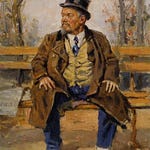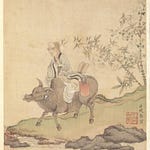Sundays with Seneca
Welcome to Sundays with Seneca on the Perennial Meditations podcast. Join the search for ancient lessons on the art of living from the writings and Stoic philosophy of Lucius Annaeus Seneca.
Today’s meditation is available to all subscribers. If you’d like access to our Daily Meditations (and Courses) on the Art of Living and our Sundays with Seneca series each week, consider becoming a paid member.
On the Fear of Death
In a letter known today as On the Fear of Death, Seneca wrote,
I have already ceased to be anxious about you. “Whom then of the gods,” you ask, “have you found as your voucher?” A god, let me tell you, who deceives no one—a soul in love with that which is upright and good. The better part of yourself is on safe ground. Fortune can inflict injury upon you; what is more pertinent is that I have no fears lest you do injury to yourself. Proceed as you have begun, and settle yourself in this way of living, not luxuriously but calmly. […]
“But,” you say, “is it not better even to lie idle than to whirl round in these eddies of business distraction?” Both extremes are to be deprecated—both tension and sluggishness. I hold that he who lies on a perfumed couch is no less dead than he who is dragged along by the executioner’s hook.
Leisure without study is death; it is a tomb for the living man.
What, then, is the advantage of retirement? As if the real causes of our anxieties did not follow us across the seas! What hiding place is there, where the fear of death does not enter? What peaceful haunts are there, so fortified and so far withdrawn that pain does not fill them with fear? […]
Therefore, gird yourself about with philosophy, an impregnable wall. Though it be assaulted by many engines, Fortune can find no passage into it. The soul stands on unassailable ground, if it has abandoned external things; it is independent in its own fortress; and every weapon that is hurled falls short of the mark. Fortune has not the long reach with which we credit her; she can seize none except him that clings to her.
Let us then recoil from her as far as we are able. This will be possible for us only through knowledge of self and of the world of Nature. The soul should know whether it is going and whence it came, what is good for it and what is evil, what it seeks and what it avoids, and what is that Reason which distinguishes between the desirable and the undesirable, and thereby tames the madness of our desires and calms the violence of our fears.
Some men flatter themselves that they have checked these evils by themselves even without the aid of philosophy; but when some accident catches them off their guard, a tardy confession of error is wrung from them. Their boastful words perish from their lips when the torturer commands them to stretch forth their hands, and when death draws nearer!
This strength of heart, however, will come from constant study, provided that you practice, not with the tongue but with the soul, and provided that you prepare yourself to meet death. To enable yourself to meet death, you may expect no encouragement or cheer from those who try to make you believe, by means of their hair-splitting logic, that death is no evil. For I take pleasure, excellent Lucilius, in poking fun at the absurdities of the Greeks, of which, to my continual surprise, I have not yet succeeded in rid- ding myself.
Our master Zeno uses a syllogism like this: “No evil is glorious; but death is glorious; therefore death is no evil.” A cure, Zeno! I have been freed from fear; henceforth I shall not hesitate to bare my neck on the scaffold. Will you not utter sterner words instead of rousing a dying man to laughter? Indeed, Lucilius, I could not easily tell you whether he who thought that he was quenching the fear of death by setting up this syllogism was the more foolish, or he who attempted to refute it, just as if it had anything to do with the matter! […]
“Nothing,” he says, “that is indifferent can be glorious; death is glorious; therefore, death is not indifferent.” You comprehend the tricky fallacy which is contained in this syllogism.—mere death is, in fact, not glorious; but a brave death is glorious. And when you say, “Nothing that is indifferent is glorious,” I grant you this much, and declare that nothing is glorious except as it deals with indifferent things. I classify as “indifferent,”—that is, neither good nor evil—sickness, pain, poverty, exile, death.
None of these things is intrinsically glorious; but nothing can be glorious apart from them. For it is not poverty that we praise, it is the man whom poverty cannot humble or bend. Nor is it exile that we praise, it is the man who withdraws into exile in the spirit in which he would have sent another into exile. It is not pain that we praise, it is the man whom pain has not coerced. One praises not death, but the man whose soul death takes away before it can confound it.
All these things are in themselves neither honorable nor glorious; but any one of them that virtue has visited and touched is made honorable and glorious by virtue; they merely lie in between, and the decisive question is only whether wickedness or virtue has laid hold upon them. […]
—
Thank you for reading/listening; I hope you found something useful.
Until next time, be wise and be well,
P.S. Feel free to comment, ask questions, or make suggestions!
















Seneca | On the Fear of Death (Part I)